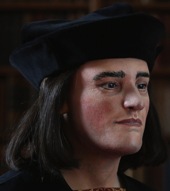 Anne O’Brien, The Virgin Widow. Mira Books, Australia 2010. ISBN 9781741 1685767 (477 pages)
Anne O’Brien, The Virgin Widow. Mira Books, Australia 2010. ISBN 9781741 1685767 (477 pages)
As a Ricardian of nearly a decade, I am familiar with the outline of Anne Neville’s short life, and the way her father “Warwick, the Kingmaker” used her as a pawn in his power dealing after losing the role of advisor to Kind Edward IV, and her eventual marriage to Richard, Duke of Gloucester, whom she had known since childhood.
This is a fictional account by Anne O’Brien, told in first person from Anne Neville’s point of view. It covers the few known facts but adds interpretations of the author’s own, most of which did not sit well with me. For instance, I have no reason to believe Margaret of Anjou or her son were utter monsters with an implied incestuous relationship. However, I realise that fiction allows the author to do as she pleases,
and if one wants facts one leans towards nonfiction. What pleases this author is to write in the genres of historical fiction and romance, according to popular book website Goodreads If I had realised any dialog from the romance genre would appear, I would have passed on reading it. In fact, wincing while reading through
these embarrassing scenes was a new experience for me as my usual reading matter never requires wincing.
As it happened, my husband and I read this one aloud together, discussing our impressions as we went. Neither one of us enjoyed this telling, but ploughed through it dutifully, as we felt we owed it to poor Anne Neville whose story is not often the main attraction. And we kept hoping the payoff would make it worth our while.
I believe it is generally an accepted historical fact that Anne escaped from her brother-in-law and legal guardian George, Duke of Clarence, and briefly lived in hiding as a serving woman in a tavern owned by Lancastrian supporters until tracked down and rescued by Richard. That episode is retold in this book by having Clarence himself banishing her to his own kitchens where she is only found and saved, by clever thinking on her part, from being sent to a cloistered convent for life so that he can claim all of her lands. The real story is much more compelling and I did not see why the author would alter it.
I am fascinated by what is known about Anne Neville, in that she was used by her scheming father to forge precarious alliances and that she had no say whatsoever about marrying Eduard, the Prince of Wales, the Lancaster heir. Then just a few years later she married the man who probably killed him. Her mind and heart must have been scrambled in those days; not knowing whom to trust or believe. Your closest loved ones willing to use you, however they could, to their own advantage. It is so monstrous that I can barely imagine what her emotional life would have been like. Dying so young almost seems like a reprieve!
Many Goodreads readers give this volume high marks, so it may be enjoyable to some people. To me it was too slow, too bland, too embarrassingly ‘bodice—ripper cliché’ in some parts, and just far too long. I was yearning for it to be over long before it was, and that is rare in my reading life. My husband soldiered on reading
aloud, however, and it finally came to an end, seemingly arbitrarily, before her second husband was even made King.
We would not recommend this book to anyone except the most diehard Ricardian with no other book at hand. There are so many wonderful Ricardian books available that I would really have to say ‘don’t bother!’ That said, there was little revelling in graphic violence, vile language or detailed sex scenes, and I appreciated that.
Leslie McCawley

One comment
Leave a reply